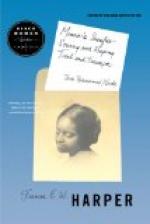“But Mr. Thomas[2] are you not looking on the dark side of the question? you must judge of the sun, not by its spots, but by its brightness.”
“Oh I did not mean to say that the ministry is crowded with unworthy men, who love the fleece more than the flock. I believe that there are in the ministry a large number who are the salt of the earth and whose life work bears witness to their fitness. But unfortunately there are men who seem so lacking in reverence for God, by their free handling of sacred things; now I think one of the great wants of our people is more reverence for God who is above us, and respect for the man who is beside us, and I do hope that our next minister will be a good man, of active brain, warm heart and Christly sympathies, who will be among us a living, moral, and spiritual force, and who will be willing to teach us on the Bible plan of ’line upon line, precept upon precept, here a little there a little.’”
“I hope he will be; it is said that brother Lomax our new minister is an excellent young man.”
“Well I hope that we will not fail to receive him as an apostle and try to hold up his hands.”
“I hope so. I think that to be called of God to be an ambassador for Christ, to help him build the kingdom of righteousness, love and peace, amid the misery, sin and strife, is the highest and most blessed position that a man can hold, and because I esteem the calling so highly I would not rush into it unless I felt divinely commissioned.”
Chapter III
Mrs. Harcourt was a Southern woman by birth, who belonged to that class of colored people whose freedom consisted chiefly in not being the chattels of the dominant race—a class to whom little was given and from whom much was required. She was naturally bright and intelligent, but had come up in a day when the very book of the Christian’s law was to her a sealed volume; but if she had not been educated through the aid of school books and blackboards, she had obtained that culture of manners and behavior which comes through contact with well-bred people, close observation and a sense of self-respect and self-reliance, and when deprived of her husband’s help by an untimely death, she took up the burden of life bravely and always tried to keep up what she called “a stiff upper lip.” Feeling the cramping of Southern life, she became restive under the privations and indignities which were heaped upon free persons of color, and at length she and her husband broke up their home and sold out at a pecuniary sacrifice to come North, where they could breathe free air and have educational privileges for their children. But while she was strong and healthy her husband, whose health was not very firm, soon succumbed to the change of climate and new modes of living and left Mrs. Harcourt a stranger and widow in a strange land with six children dependent on her for bread and shelter: but during her short sojourn




